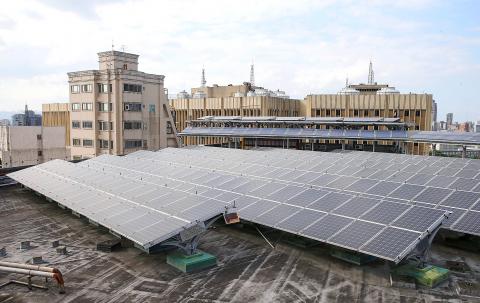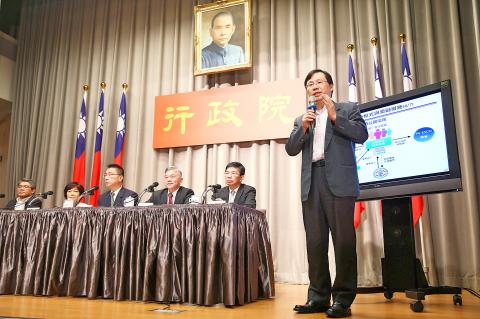The Cabinet has approved a plan to subsidize the construction and design costs of residential rooftop solar systems, starting next year, as part of its efforts to boost solar power generation.
A stimulus package introduced yesterday would offer subsidies to households installing rooftop solar systems, covering 40 percent of construction costs and 100 percent of design costs, from next year to 2020, Minister of Economic Affairs Shen Jong-chin (沈榮津) said.
The government would also offer subsidies for the construction of public solar power stations in remote areas and Aboriginal lands, covering 100 percent of design costs, Shen said.

Photo: CNA
It would offer a subsidy of up to NT$600,000 for each power station for the construction of power lines, and would promise to purchase the extra electricity generated, Shen added.
The package is part of the government’s efforts to phase out nuclear power and increase the share of renewable energy to 20 percent of the nation’s power supplies by 2025.
The government hopes to increase the power generation capacity of rooftop solar systems from 410 megawatts at present to 3,000 megawatts by 2020, Shen said.

Photo: CNA
The government would first target homes with the goal of converting communities into solar power plants, and then encourage people living in remote areas to install rooftop solar systems and build public power stations, he said.
It would also require private companies that consume more than 800 kilowatts of electricity per month to construct rooftop solar power systems, Shen said.
“The domestic market will be bolstered with the development of rooftop systems. The solar panel industry, iron factories, electricians and the shipping industry will all benefit,” Shen said.
The package also eases building restrictions on illegal rooftop structures.
Owners of illegal structures would not be able to apply for a license to build solar systems, but the Cabinet is planning to lift the ban to allow solar panels to be placed on such structures if the combined height does not exceed 4.5m, Deputy Minister of the Interior Hua Ching-chun (花敬群) said.
“However, that does not mean illegal structures will be legalized. Those structures are still illegal even if they are topped with solar panels, but the solar panels could be kept even if the structures are demolished,” Executive Yuan spokesman Hsu Kuo-yung (徐國勇) said.
Premier William Lai (賴清德) said that the growth of renewable energy can create jobs and increase Taiwan’s global influence.
The Cabinet also plans to establish a legal platform to eliminate gray areas in the law for start-ups and innovators in a bid to build a friendly investment environment.
The platform, to be led by the National Development Council, is to smooth out legal uncertainties encountered by businesses that are developing a new business model.
The Cabinet said that in principle it would allow everything that is not prohibited by the law.

ACTION PLAN: Taiwan would expand procurement from the US and encourage more companies to invest in the US to deepen bilateral cooperation, Lai said The government would not impose reciprocal tariffs in retaliation against US levies, President William Lai (賴清德) said yesterday, as he announced five strategies to address the issue, including pledging to increase Taiwanese companies’ investments in the US. Lai has in the past few days met with administrative and national security officials, as well as representatives from various industries, to explore countermeasures after US President Donald Trump on Wednesday last week announced a 32 percent duty on Taiwanese imports. In a video released yesterday evening, Lai said that Taiwan would not retaliate against the US with higher tariffs and Taiwanese companies’ commitments to

Intelligence agents have recorded 510,000 instances of “controversial information” being spread online by the Chinese Communist Party (CCP) so far this year, the National Security Bureau (NSB) said in a report yesterday, as it warned of artificial intelligence (AI) being employed to generate destabilizing misinformation. The bureau submitted a written report to the Legislative Yuan in preparation for National Security Bureau Director-General Tsai Ming-yen’s (蔡明彥) appearance before the Foreign Affairs and National Defense Committee today. The CCP has been using cognitive warfare to divide Taiwanese society by commenting on controversial issues such as Taiwan Semiconductor Manufacturing Co’s (TSMC, 台積電) investments in the

HELPING HAND: The steering committee of the National Stabilization Fund is expected to hold a meeting to discuss how and when to utilize the fund to help buffer the sell-off The TAIEX plunged 2,065.87 points, or 9.7 percent, to close at 19,232.35 yesterday, the highest single-day percentage loss on record, as investors braced for US President Donald Trump’s tariffs after an extended holiday weekend. Amid the pessimistic atmosphere, 945 listed companies led by large-cap stocks — including Taiwan Semiconductor Manufacturing Co (TSMC, 台積電), Hon Hai Precision Industry Co (鴻海精密) and Largan Precision Co (大立光) — fell by the daily maximum of 10 percent at the close, Taiwan Stock Exchange data showed. The number of listed companies ending limit-down set a new record, the exchange said. The TAIEX plunged by daily maxiumu in just

‘COMPREHENSIVE PLAN’: Lin Chia-lung said that the government was ready to talk about a variety of issues, including investment in and purchases from the US The National Stabilization Fund (NSF) yesterday announced that it would step in to staunch stock market losses for the ninth time in the nation’s history. An NSF board meeting, originally scheduled for Monday next week, was moved to yesterday after stocks plummeted in the wake of US President Donald Trump’s announcement of 32 percent tariffs on Taiwan on Wednesday last week. Board members voted to support the stock market with the NT$500 billion (US$15.15 billion) fund, with injections of funds to begin as soon as today. The NSF in 2000 injected NT$120 billion to stabilize stocks, the most ever. The lowest amount it